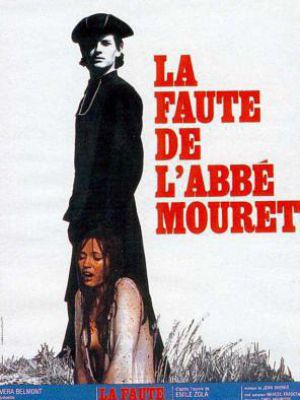
莫雷教士的过失
(1970)
评分:
-
音画
0.0分 / 0人
-
表演
0.0分 / 0人
-
剧情
0.0分 / 0人
-
编辑
导演:GeorgesFranju
- 类型:剧情 制片地区:法国 影乐酷ID:5055902dv IMDB:tt0065715
- 片长:France: 100 上映:1970
简介:Serge Mouret is a frail and devout young priest in a tough country parish. When he falls down and loses his memory, he is nursed back to health by Albine, the beautiful carefree niece of the outspoken atheist Jeanbernat. After Serge and Albine fall in love, Serge recovers his memory and realizes the grave sin he has committed. "La faute de l'abbé Mouret" is one of the weakest books in the Rougon -Macquart saga .Its "scandalous" side -a priest falling in love with a beautiful girl-seems tame by today's standards ,and it already was thirty-five years ago when I saw the film in a theater.Also handicapped by Gillian Hills's amateurish playing ,the movie was a flop.Francis Huster ,an earnest thespian (he used to play Corneille's "Le Cid" ) became famous but he had to wait until the eighties .The lack of good parts in the films probably led him to come back to stage again in the nineties.Best parts take place in the village where Franju shows his die-hard anti-clericalism,and André Lacombe as Archangias steals every scene he is in.but all that concerns "the Paradou" (the garden) sounds "hippie" and has not worn well. Jonathan Rosenbaum wrote: After observing the cold brilliance of THOMAS L’IMPOSTEUR only recently, it is depressing to discover that Franju is capable of such flat, undistinguished work as his latest film. Without having read the Zola novel from which this was taken, I cannot give an adequate explanation of how or why the source has been betrayed. The anti-Catholicism of earlier Franju films is certainly not muted here, but its expression is trivialized by so many village-atheist conceits that one looks in vain for the subtlety and irony that underlines his previous efforts. The middle section of the film, chronicling a romantic idyll between an abbot suffering amnesia and a golden-haired ingenue, is every bit as restrained as ELVIRA MADIGAN crossed with Zeffirelli’s ROMEO AND JULIET. One brief, stunning Franjuvian moment occurs when the abbot is lifting a statue out of a crate, and the framing of the shot, by eliminating his hands, turns the movement into a magical ascension of the Virgin out of excelsior.



